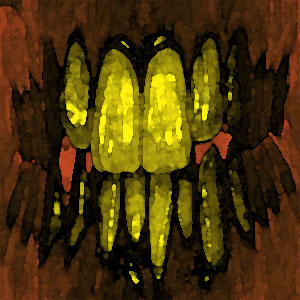No word wasted. Each word weighted with authority and meaning. Density. Intensity. Fixity. It’s all going on here. Talk about the importance of “compression” in flash—and your work in general.
I think this comes from my background as an illustrator. When you draw and paint, every stroke matters, economy of line is crucial. Over the last few years, I have studied the craft elements such as character arc, rising conflict, scene construction and others. What I love about short fiction (and flash in particular) is that you need to compress all these elements, every word does matter, nothing is wasted—no “loose baggy monsters” as Henry James would say. The challenge is to capture the moment not only in time and space, but also in emotion. The act of compression, notably in flash fiction, forces the writer to ask some hard questions—starting with, “why am I telling this story?”
What’s the key/secret to capturing childhood as masterfully as you do here? What accounts for the allure and power of this time—not only for the writer, but for us, your readers?
It is more than thinking like a child or a teen. We might think we are getting inside a kid’s head, but as writers (and readers), we are looking at that period of life through our lens of adulthood. In other words, what does it mean to us now? Childhood is full of moments of epiphany, and times that we remember in such vivid detail that we feel they must carry meaning—even if we don’t fully comprehend that meaning. Some moments are so evocative that I find I can lose myself in them, time travel, I guess. To capture that time, I mentally go back to that street, sit on the curb and just listen.
“My mom never called me.” That line has such power here. It’s as if the story and its images exist to build up to that line, to create its mysterious pull and poignancy. What do you make of this line?
I think that is an astute observation. The answer lies in the “why am I telling this story” and in capturing something more than a time and place. In childhood, we can be a part of something and I mean deeply engaged by the sounds, the smells, the close friendships and the physical environment. In the midst of this event, in the case of “Night Birds” it’s a street hockey game, there is something else that tugs at us. That something evokes an emotion and a deeper sense of who we are. I am intrigued by looking at those times and how the memory of them can form a type of redemption, even years later.
How’s the collection—The Plate Spinner—coming along? What can you tell us about it?
It goes quite well, thanks. I have decided upon the thirteen stories that will comprise the collection. I have been going through each story and seeing if further compression, or sometimes expansion, is needed. The stories are linked by the theme of memory and the telling of hidden stories. As I mentioned, I believe that looking through the lens of memory can open up the possibility of redemption. I say, “possibility” because it is not so clean cut as to say that by examining the past you can redeem your present or future. Yet, we do revisit our past memories and say “why then” and “what now.” I am hoping the manuscript will be ready to send out by the end of March.
At the recent AWP conference, a number of writers talked about their old flames, books that have influenced them during a formative time in their lives—and ones they return to for lessons in writing and, of course, life. Discuss your old flame, both what it meant to you then and what it means to you now.
I have a number of old flames depending on how far back I choose to go. But the one that I return to for lessons in writing is clear. Richard Ford’s Rock Springs has been more like an obsession than an old flame. I have poured over it and wondered how he created such beauty in a barren place, such honest emotion and most importantly, how he brought truth out of story. I have heard Ford in interviews say that readers have romanticized Rock Springs. I am delightfully guilty there. Many nights I fall asleep with with that book resting at my bedside. So far, my wife hasn’t said anything.



 The core workshop of SmokeLong Fitness is all in writing, so you can take part from anywhere at anytime. We are excited about creating a supportive, consistent and structured environment for flash writers to work on their craft in a community. We are thrilled and proud to say that our workshop participants have won, placed, or been listed in every major flash competition. Community works.
The core workshop of SmokeLong Fitness is all in writing, so you can take part from anywhere at anytime. We are excited about creating a supportive, consistent and structured environment for flash writers to work on their craft in a community. We are thrilled and proud to say that our workshop participants have won, placed, or been listed in every major flash competition. Community works.